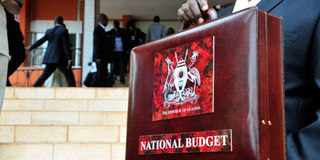How government will finance Shs45 trillion budget

Finance minister Matia Kasaija displays the Budget briefcase last year. PHOTO / RACHEL MABALA
What you need to know:
- Last month, the President announced that the country had lost $1.3 billion worth of remittances from abroad due to covid-19 pandemic.
In his pre-election year budget, Finance minister Matia Kasaija will internally raise up to Shs32.97 trillion to fund part of the spending pressures in the 2020/21 financial year. The balance of Shs12.52 trillion will come from external sources such as loans and grants.
According to figures approved by Parliament in April, the election- year budget has increased by 12.3 per cent compared to the Shs40.5 trillion appropriated for the current financial year.
Internally, the government intends to raise Shs21.7 trillion from domestic revenues while Shs3.5 trillion will come from domestic financing to recapitalise Banks of Uganda.
The government also intends to raise another Shs7.4 trillion for debt re-financing and an additional Shs215.6 billion will from local revenue for local governments.
External budget support
From the external sources, Mr Kasaija projects that Shs2.9 trillion will come from budget support and another Shs9.6trillion will come from project support.
Budget support is a method of financing the budget through a transfer of resources from an external financing agency to the partner government’s national treasury.
Budget support, according to Ministry of Finance spokesperson Jim Mugunga, is a package of financing, conditionality, policy dialogue and technical assistance. It may be provided either as general budget support (GBS) or as sector budget support (SBS). GBS supports the implementation of a National Development Plan III, while SBS supports the implementation of a sector-development programme.
The government intends to fund the budget by 72.5 per cent while 27.5 per cent will come from the external pool. The government used to rely on donor money to finance the budget but the situation has since improved.
Traditionally, Mr Mugunga explained that donors have provided aid either through the financing of specific projects (project aid), which often involved direct participation in their design and implementation, or through providing support to the recipient government’s budget (conditional budget support) while imposing conditionality on how to allocate the available resources.
With economy and businesses struggling to remain afloat due to Covid-19 pandemic, Mr Kasaija and the Uganda Revenue Authority face an uphill task ahead. Tax and related revenue sources are projected to nose-dive due to the slow pace of recovery in the private sector, especially for the tourism and hospitality, the country’s major revenue drivers.
From the external sources, the country is likely to suffer slow remittances from migrant workers abroad as well as development finance partners. Last month, the President announced that the country had lost $1.3 billion worth of remittances from abroad due to covid-19 pandemic.
Government has since unveiled a stimulus package for struggling businesses even as experts say the measures are too inadequate to cushion both the economy and tax payers.
Parliament has already noted with concern that the country’s total domestic revenue (inclusive of Local Government Revenue) in the 2020/21 financial year accounts for only 48.2 per cent of the projected resource envelope, leaving the country with unsolved shortfalls.



